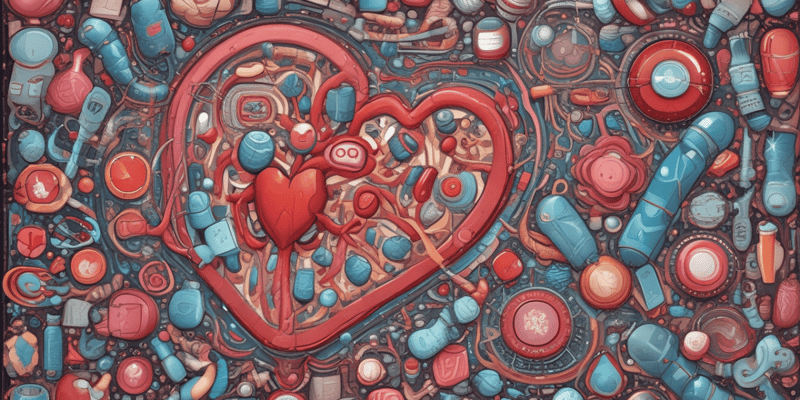Podcast
Questions and Answers
What is the most likely blood pressure measurement that would classify a patient as having hypertension?
What is the most likely blood pressure measurement that would classify a patient as having hypertension?
Which pharmacological management strategy is recommended when initial monotherapy for primary hypertension is unsuccessful?
Which pharmacological management strategy is recommended when initial monotherapy for primary hypertension is unsuccessful?
What can exacerbate cardiovascular conditions, leading to the need for antihypertensive therapy?
What can exacerbate cardiovascular conditions, leading to the need for antihypertensive therapy?
Which antihypertensive drug group works primarily by inhibiting the effects of sympathetic nervous system activity?
Which antihypertensive drug group works primarily by inhibiting the effects of sympathetic nervous system activity?
Signup and view all the answers
What is one potential fatal consequence of untreated hypertension?
What is one potential fatal consequence of untreated hypertension?
Signup and view all the answers
Which of the following is considered a primary risk factor for the development of hypertension?
Which of the following is considered a primary risk factor for the development of hypertension?
Signup and view all the answers
What is the role of diuretics in the treatment of hypertension?
What is the role of diuretics in the treatment of hypertension?
Signup and view all the answers
Which statement accurately reflects a characteristic of secondary hypertension?
Which statement accurately reflects a characteristic of secondary hypertension?
Signup and view all the answers
Study Notes
Cardiovascular Pharmacology
- The heart pumps blood to the lungs and systemic circulation
- Heart efficiency can be impaired by:
- Compromised contractility (heart failure)
- Drugs for heart failure
- Heart rhythm disturbances (antiarrhythmics)
- Heart attack (angina pectoris) (antiangina)
- Chronic increase in blood pressure (antihypertension)
- Atherosclerosis
Antihypertensive Agents (AH)
- Hypertension (HT) is defined as a systolic blood pressure (SBP) of 140 mmHg or greater, and/or a diastolic blood pressure (DBP) of 90 mmHg or greater.
- Two types of hypertension
- Secondary HT, treated with causal therapy.
- Primary HT, treated with anti-hypertensive (AH) agents.
- Hypertension has serious consequences, including stroke, myocardial infarction (MI), and renal failure.
Etiology of Hypertension
- Age and race are factors contributing to hypertension.
How to Measure Blood Pressure
- Before taking blood pressure:
- No food or drinks 30 minutes prior
- Empty bladder
- During blood pressure measurement:
- No talking
- Arm resting at chest height
- Cuff against bare skin
- Back supported
- Feet flat on the floor
Non-Pharmacological Management of Hypertension
- Diet approaches like DASH (Dietary Approaches to Stop Hypertension)
- Regular exercise
- Weight management
- Stress reduction
- Limiting alcohol consumption
- Smoking cessation
Pharmacological Management of Hypertension
- Primary Hypertension: Initial monotherapy
- Unsuccessful: Polypharmacy
- Drug choices involving different drug groups to maximize efficacy and minimize side effects
- Severe or malignant hypertension: Hospitalization is likely
Antihypertensive (AH) Classification
- Four major drug groups:
- Diuretics
- Sympatholytics
- Vasodilators
- Angiotensin antagonists
Studying That Suits You
Use AI to generate personalized quizzes and flashcards to suit your learning preferences.
Related Documents
Description
Test your knowledge on cardiovascular pharmacology, including the function of the heart and the various drugs used to address heart conditions such as heart failure and hypertension. This quiz will cover crucial topics such as the etiology of hypertension, types of antihypertensive agents, and methods for measuring blood pressure.




